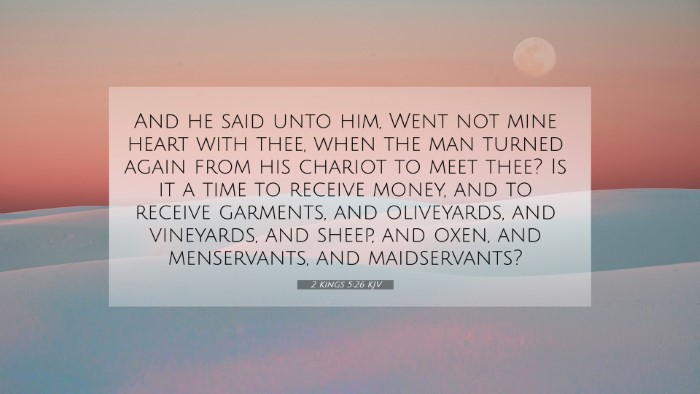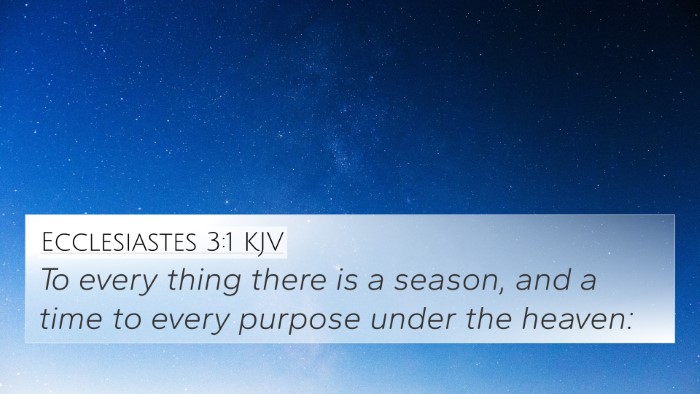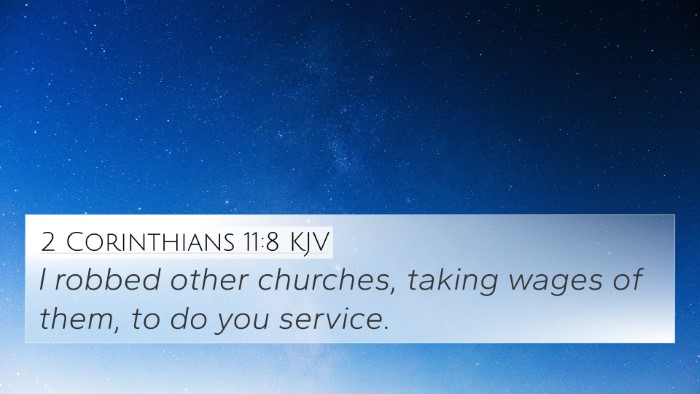Understanding 2 Kings 5:26
Verse: "But he said unto him, Went not mine heart with thee, when the man turned again from his chariot to meet thee? Is it a time to receive monies, and to receive garments, and olive yards, and vineyards, and sheep, and oxen, and menservants, and maidservants?"
Context and Background
In this passage, the prophet Elisha addresses his servant Gehazi after he deceitfully accepted gifts from Naaman, a Syrian commander who had been healed of leprosy. Elisha’s words reveal a deep spiritual insight, indicating that Gehazi’s actions and motives are fully known to God.
Verse Meaning
The prophet's inquiry emphasizes the following key themes:
- God’s Omniscience: Elisha’s capacity to see beyond the physical realm underscores God's omnipresence and omniscience. He fully perceives our intentions and actions.
- The Seriousness of Greed: Gehazi's greed for material wealth stands in stark contrast to the spiritual service he was called to provide. Elisha exposes the folly of prioritizing earthly gain over divine trust.
- Consequences of Dishonesty: Gehazi’s theft would eventually lead to dire consequences, reminding us of the biblical principle that dishonest gain incurs divine judgment.
- Time of Spiritual Reflection: Elisha’s rhetorical question, “Is it a time…?” suggests that the mission of God's servants should focus on spiritual matters rather than material pursuits.
Commentary Insights
Matthew Henry: In his commentary, Henry points out that Gehazi's actions were not merely an act of greed but also a betrayal of sacred trust. Elisha's heart was with Gehazi, symbolizing a prophetic care that was both relational and spiritual.
Albert Barnes: Barnes emphasizes that Elisha's rhetorical question reveals the broader perspective on the timing and context of Gehazi’s deceit. He notes that spiritual matters should take precedence over material gains.
Adam Clarke: Clarke asserts that Gehazi’s actions were a significant turning point, emphasizing that his desire for worldly possessions caused him to forsake spiritual integrity and accountability.
Related Cross-References
This verse relates to several other scriptures that enhance its understanding:
- 1 Timothy 6:9-10 - Warns against the love of money.
- 2 Kings 4:42-44 - Highlights God’s provisions for needs over wants.
- Luke 12:15 - Jesus warns about greed and emphasizes that life is more than possessions.
- Proverbs 15:27 - States that a greedy man brings trouble to his household.
- Psalm 119:36 - A prayer for love of God's commandments over earthly treasures.
- Matthew 6:19-21 - Teaches about laying up treasures in heaven instead of on earth.
- Hebrews 13:5 - Encourages contentment rather than covetousness.
Thematic Connections
This verse opens the door to exploring several thematic connections within the Bible:
- Divine Accountability: Many scriptures emphasize that believers are accountable to God for their actions (Romans 14:12, 2 Corinthians 5:10).
- Material vs. Spiritual Wealth: Numerous passages discuss the tension between accumulating earthly wealth and seeking spiritual richness (Matthew 6:24, James 4:4).
- Integrity in Ministry: The Bible urges leaders to be above reproach in their conduct (1 Peter 5:2-3, Titus 1:7).
Conclusion
2 Kings 5:26 serves as a profound reminder of the importance of spiritual integrity, divine awareness, and the serious consequences of dishonesty in our pursuits. By delving into this verse, believers are encouraged to reflect on their priorities and align their actions with God's will.


















